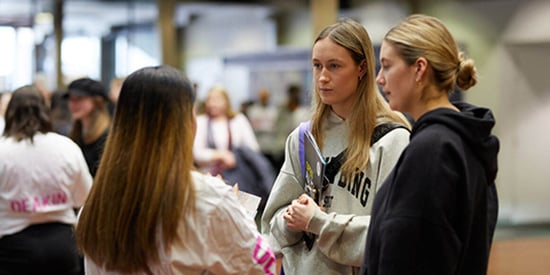Accredited by APAC
Pathway to Victoria’s only organisational psychology program
140 hours of industry experience
Key facts
Key dates
Direct applications to Deakin for Trimester 2 2024 close 23 June 2024
Direct applications to Deakin for Trimester 3 2024 close 27 October 2024
Current Deakin Students
To access your official course details for the year you started your degree, please visit the handbook
Course overview
Gain an insight into why people think, feel and behave the way they do when you study psychological science at Deakin. You will discover the complexity of human personality and behaviour, and graduate with a versatile degree that helps you pursue a range of different career options.
This course exposes you to a contemporary integrative approach to psychology – one that recognises the importance of, and interrelationships between, biological, developmental, social, cognitive, and developmental factors.
You will cover areas of psychology including behavioural and clinical neuroscience, child and adolescent psychology, relationships and the psychology of groups, cognitive psychology, forensic psychology, and psychopathology. You will also have the opportunity to develop your counselling skills through a suite of elective units.
Following completion of the Bachelor of Psychological Science students intending to become psychologists must successfully apply for and complete a level-4 Honours year or the level-4 Graduate Diploma of Psychology. This will allow students to register as provisional psychologists. Students wishing to become fully registered psychologists would need to continue studying by undertaking either a Masters or Doctorate qualification in psychology to meet full registration requirements.
Deakin’s School of Psychology has strong partnerships with industry, including collaborative activities with government agencies, public and private organisations, hospitals, and other universities. These partnerships ensure that our courses remain relevant to industry and workforce needs.
Deakin's Bachelor of Psychological Science is recognised for registration by the Psychology Board of Australia, accredited by the Australian Psychology Accreditation Council (APAC) and enables you to undertake additional study in pursuit of professional registration.
As a graduate, you may seek work in mental and general hospitals and clinics, business and industry, education, the criminal justice system, media, marketing, sport and research. Fully-registered psychologists enjoy roles in clinical, forensic, organisational, educational, health, and sport settings.
Read MoreCourse information
- Award granted
- Bachelor of Psychological Science
- Year
- 2017 course information
- Deakin code
- H344
- CRICOS code?
- 079316E Burwood (Melbourne), Waurn Ponds (Geelong)
- Approval status
- This course is approved by the University under the Higher Education Standards Framework.
- Australian Qualifications Framework (AQF) recognition
The award conferred upon completion is recognised in the Australian Qualifications Framework at Level 7.
Core units
Course structure applies for students who commenced in 2016 onwards.
Students who commenced in 2014 and 2015 should refer to previous online Handbooks or consult your course enrolment officer.
Level 1 - Trimester 1
plus one level 1 elective unit from any discipline
Level 1 - Trimester 2
plus two level 1 elective units from any discipline
Level 2 - Trimester 1
plus two level 2 elective units from psychology or any discipline
Level 2 - Trimester 2
plus one level 2 or level 3 HPS psychology elective unit AND one level 2 elective unit
Level 3 - Trimester 1
plus one level 3 HPS psychology elective unit and one level 3 elective unit
Level 3 - Trimester 2
plus one level 3 HPS psychology elective unit OR one level 3 health elective unit
AND
one level 3 elective unit
Elective units
Three of the 11 elective units must be chosen from the psychology units listed below - one from level 2 or level 3 and two from level 3.
Trimester 1
Trimester 2
The remaining eight electives may include other psychology units such as:
or
students may choose to take complementary studies in other disciplines.
Intakes by location
The availability of a course varies across locations and intakes. This means that a course offered in Trimester 1 may not be offered in the same location for Trimester 2 or 3. Check each intake for up-to-date information on when and where you can commence your studies.
Deakin splits the academic year into three terms, known as trimesters. Most students usually undertake two trimesters each year (March-June, July-November).
Workload
As a student in the Faculty of Health you can expect to participate in a range of teaching activities each week. This could include classes, seminars, practicals and online interaction. You can refer to the individual unit details in the course structure for more information. You will also need to study and complete assessment tasks in your own time
Work experience
As part of this course, you will also be given the opportunity to undertake preparation for work and work placement elective units as well as elective units designed to develop your counselling skills.
Entry requirements
Scholarship options
A Deakin scholarship could help you pay for your course fees, living costs and study materials. If you've got something special to offer Deakin - or maybe you just need a bit of extra support - we've got a scholarship opportunity for you. Search or browse through our scholarships
Apply now
Applications for Trimester 1, 2025 open in August. Each year, thousands of students prepare for uni with the help of Deakin support services. We offer a huge range of support, including one-on-one consultations, webinars, online resources and events throughout the year.
Some of our courses have limited places available - for the latest on courses still open for application, visit Courses by trimester.
Create an account in the Deakin Application Portal, start your application, enter personal details, education experience, upload supporting documents and submit. Need help? Play this video, or contact one of our friendly future student advisers on 1800 693 888 or submit an online enquiry.
You can apply for this course through the Indigenous Access Scheme, which recognises the achievements of Aboriginal and Torres Strait Islander students and considers the skills, experience and community work that prepares you for study. We look beyond your ATAR and academic results so we can reward your hard work with a place at university.
Entry pathways
View pathways into the Bachelor of Psychological Science with our pathways finder.
Contact information
Health - Student and Academic Services
Tel 03 9251 7777
health-enquire@deakin.edu.au
Careers
Want a degree that’s more than just a qualification? Our industry connections, world-class facilities and practical approach to learning are just some of the reasons why Deakin students graduate confident and ready to thrive in the jobs of tomorrow.
Course learning outcomes
Deakin's graduate learning outcomes describe the knowledge and capabilities graduates can demonstrate at the completion of their course. These outcomes mean that regardless of the Deakin course you undertake, you can rest assured your degree will teach you the skills and professional attributes that employers value. They'll set you up to learn and work effectively in the future.
| Graduate Learning Outcomes | Course Learning Outcomes |
| Discipline Specific knowledge and capabilities | Integrate theoretical knowledge of the discipline of psychology in relation to: health, social, cognitive, methodology, neuroscience, development, and personality. |
| Communication | Communicate psychological knowledge and arguments effectively using the most appropriate means utilising clear, discipline appropriate, coherent and well-developed communication skills. |
| Digital Literacy | Utilise online technologies to interact with others, access research and evaluate empirical evidence; and create and disseminate psychology-relevant content. |
| Critical thinking | Identify and critique the factors that contribute to the development of unhealthy mental processes and behaviours, develop arguments, reports, or commentaries based on empirical research and apply the results to affect healthy behaviour change in oneself or others, and; apply the skills required to affect healthy behaviour change in oneself and in others in diverse contexts. |
| Problem Solving | Apply knowledge of the scientific method when addressing problems related to behaviour and mental processes; design, plan, and conduct research that addresses these problems; and apply analytic and statistical skills to interpret the results and validity of research. |
| Self-management | Engage in independent learning as a reflective practitioner to sustain personal and professional development in the changing world of the science and practice of psychology; and manage resources, timelines and other constraints to achieve quality and timely outcomes. |
| Teamwork | Collaborate and communicate psychological principles and practices effectively in interdisciplinary teams to work and learn in a range of environments including communities of practice, research and professional practice. |
| Global Citizenship | Embody the values and attitudes of the scientist-practitioner; applying ethical and professional responsibilities to local and global communities and future clients and employers; within diverse cultural, social, and regulatory frameworks. |




